On the two nights of Rosh Hashanah, Jews enjoy a festive meal in the light of candles, which are lit before a brief blessing is said. The meal begins with Kiddush, a blessing over wine, and then continues with blessings over round challah bread dipped in honey and other foods that express our wishes for a plentiful, spiritually uplifting, and sweet new year.
In this article:
Candles
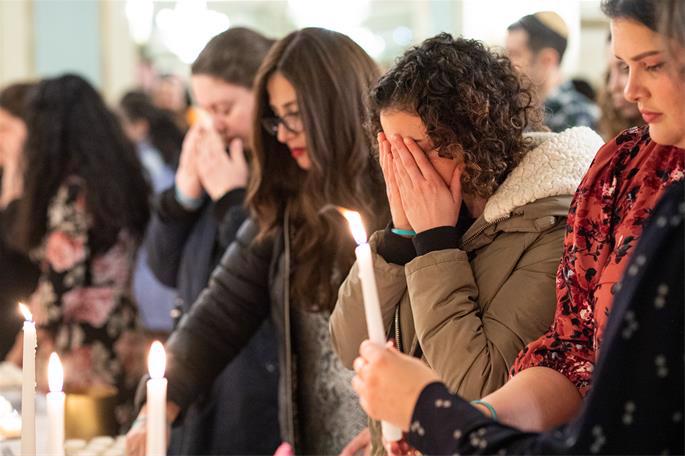
Girls and all women who are in the house (or if there isn't a woman in the house, the head of the household), light candles so that the festive table is bathed in their glow. See Procedure for Holiday Candle Lighting for detailed holiday candle-lighting information.
The following is said after the candles are lit:
- בָּרוּךְ אַתָּה אֲדֹנָי אֱלֹהֵינוּ מֶלֶךְ הָעוֹלָם אֲשֶׁר קִדְּשָׁנוּ בְּמִצְוֹתָיו וְצִוָּנוּ לְהַדְלִיק נֵר שֶׁל (שַׁבָּת וְשֶׁל) יוֹם הַזִּכָּרוֹן
בָּרוּךְ אַתָּה אֲדֹנָי אֱלֹהֵינוּ מֶלֶךְ הָעוֹלָם שֶׁהֶחֱיָנוּ וְקִיְּמָנוּ וְהִגִּיעָנוּ לִזְּמַן הַזֶּה - Bah-rookh ah-tah ah-doh-noi eh-loh-hay-noo meh-lekh hah-oh-lahm, ah-shehr ki-deh-shah-noo beh-mitz-voh-tahv veh-tzee-vah-noo leh-hahd-lik nayr (shehl shah-baht veh-shehl) yohm hah-zee-kah-rohn.
Bah-rookh ah-tah ah-doh-noi eh-loh-hay-noo meh-lekh hah-oh-lahm sheh-heh-kheh-yah-noo veh-kee-mah-noo ve-hig-ee-yah-noo liz-mahn hah-zeh. - Blessed are you, L-rd our G‑d, King of the universe, who has sanctified us with His commandments, and has commanded us to kindle the light of (the Sabbath and) the Day of Remembrance.
Blessed are You, Lord our G‑d, King of the universe, who has granted us life, sustained us, and enabled us to reach this occasion.
Kiddush
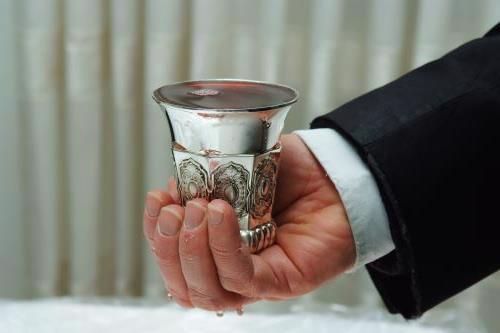
Before starting the Rosh Hashanah meal, we sanctify the holiday by reciting the kiddush over a cup of wine or grape juice. Click here for the Hebrew/English text of the kiddush.1
New Fruit

On the second night of Rosh Hashanah, a "new fruit," i.e., a seasonal fruit which we have not yet tasted since its season began, should be present on the table when the holiday candles are kindled and during the kiddush. While reciting the Shehecheyanu blessing after candle-lighting and after the kiddush, one should have the new fruit in mind.2
This fruit is eaten following the kiddush, before washing for bread. Before partaking of the fruit we say the following blessing:
Bah-rookh ah-tah ah-doh-noi eh-loh-hay-noo meh-lekh hah-oh-lahm boh-ray peh-ree hah-aytz.
בָּרוּךְ אַתָּה יְהוָה אֱלֹהֵינוּ מֶלֶךְ הָעוֹלָם בּוֹרֵא פְּרִי הָעֵץ
Blessed are You, L-rd our G‑d, King of the universe, who creates the fruit of the tree.
Challah in Honey
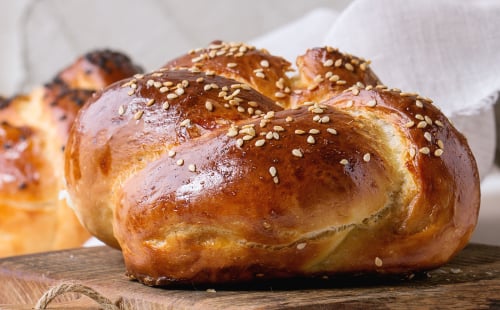
Immediately following the kiddush (and on the second night, the eating of the new fruit), we perform the ritual washing for bread, after which we say the following blessing:
Bah-rookh ah-tah ah-doh-noi eh-loh-hay-noo meh-lekh hah-oh-lahm, ah-shehr ki-deh-shah-noo beh-mitz-voh-tahv veh-tzee-vah-noo ahl neh-tee-laht yah-dah-yim.
בָּרוּךְ אַתָּה יְהוָה אֱלֹהֵינוּ מֶלֶךְ הָעוֹלָם, אֲשֶׁר קִדְּשָׁנוּ בְּמִצְווֹתָיו, וְצִוָּנוּ עַל נְטִילַת יָדָיִם
Blessed are you, L‑rd our G‑d, King of the universe, who has sanctified us with His commandments, and commanded us concerning the washing of the hands.
When everyone has returned to the table, we raise the two challah loaves and recite the Hamotzie blessing:
Bah-rookh ah-tah ah-doh-noi eh-loh-hay-noo meh-lekh hah-oh-lahm, hah-moh-tzee leh-khehm min hah-ah-rehtz.
בָּרוּךְ אַתָּה יְהוָה אֱלֹהֵינוּ מֶלֶךְ הָעוֹלָם הַמּוֹצִיא לֶחֶם מִן הָאָרֶץ
Blessed are You, L-rd, our G‑d, King of the universe, who brings forth bread from the earth.
Cut the challah, dip it in honey (some also dip it in salt), and have a bite. Pass around pieces and make sure everyone does the same.
Browse a selection of honey dishes here.
Symbolic Foods

On the first night of Rosh Hashanah, after eating the challah with honey, it is customary to eat several foods which symbolize the type of year we wish to have:
We dip a piece of sweet apple into honey. Before eating it we say:
Bah-rookh ah-tah ah-doh-noi eh-loh-hay-noo meh-lekh hah-oh-lahm boh-ray peh-ree hah-aytz.
בָּרוּךְ אַתָּה יְהוָה אֱלֹהֵינוּ מֶלֶךְ הָעוֹלָם בּוֹרֵא פְּרִי הָעֵץ
Blessed are You, L-rd our G‑d, King of the universe, who creates the fruit of the tree.
Yeh-hee rah-tzohn sheh-teh-khah-daysh ah-lay-noo shah-nah toh-vah oo-meh-too-kah.
יְהִי רָצוֹן שֶׁתְּחַדֵּשׁ עָלֵנוּ שָׁנָה טוֹבָה וּמְתוּקָה
May it be Your will to renew for us a good and sweet year.
A head of a fish, ram, or other kosher animal, is served. This symbolizes our desire to be at the "head of the class" this year.
A pomegranate is eaten, symbolizing our wish to have a year full of mitzvot and good deeds as a pomegranate is filled with luscious seeds.
Throughout the meal, it is customary to also eat foods whose names in the vernacular allude to blessing and prosperity. For example, many have the custom of eating a carrot dish called tzimmes, because in Yiddish the word for carrots, meren, means to multiply.
Rosh Hashanah Cuisine

On Rosh Hashanah it is customary not to eat foods which are sour or tart (the gefilte fish will have to do without the horseradish...). Instead, the focus is on sweet foods, symbolizing our desire to have a sweet year, blessings and abundance. It is also customary not to eat nuts on Rosh Hashanah, as the numerical value of the Hebrew word for nuts ("egoz") is the same as the Hebrew word for sin ("chet").
Click here for traditional Rosh Hashanah recipes.
Click here for Rosh Hashanah foods according to Sephardic custom.






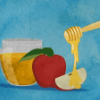
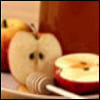
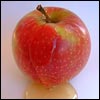









Join the Discussion